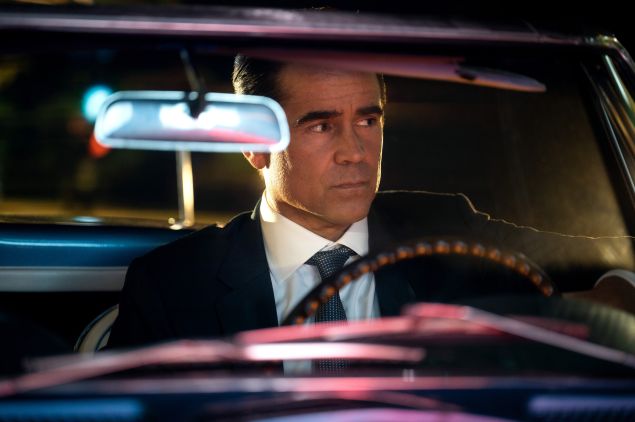Watch the trailer for Sugar and you’ll see what appears to be a fairly ordinary neo-noir set in present day Los Angeles centered around a stylish, reserved, square jawed detective played by Colin Farrell. Just what producer/star Farrell and creator Mark Protosevich—a screenwriter known for high genre projects like I Am Legend, The Cell, and Spike Lee’s Oldboy remake—are doing making a series this vague and generic isn’t at all clear. Something doesn’t add up.
That, as it turns out, is exactly the sort of curiosity that Protosevich, Farrell, and producer/director Fernando Meirelles (City of God) are hoping to provoke. This is a mystery that challenges the viewer to figure out what kind of story it is. The series follows Farrell as John Sugar, a private detective who exclusively works missing person cases. Sugar is impossibly cool, a soft-spoken man who can best anyone in combat, but would rather talk things out in one of the countless languages he speaks. He drives a pristine 1966 Stingray, dresses in Saville Row suits, and has an encyclopedic knowledge of classic cinema. He has modeled himself after the film noir heroes of old, and it’s such a natural fit that it never seems as if Sugar (or Farrell for that matter) is putting it on. He really is the kindest, most competent sad-eyed romantic hero you could ask for, to the extent that those who encounter him are left wondering “Who is this guy?”
At first, the mystery of John Sugar’s past and motivations is mostly background for a traditional L.A. noir caper. Sugar is hired by a Hollywood producer (James Cromwell) to investigate the disappearance of his 25-year-old granddaughter, Olivia Siegel (Sydney Chandler). The Siegels are legendary Hollywood royalty with a long, scandalous history, and in typical genre fashion finding Olivia may require unearthing skeletons that the family would rather stay buried. Her disappearance is part of a much larger conspiracy, one that also ties into Sugar’s own enigmatic history.
The missing person case drives the plot, but it’s the mystery around Sugar that keeps the show interesting. Almost the entire series is told from his perspective: We’re in his head, close to him, getting to know him and yet knowing next to nothing about him. Farrell is totally captivating in the role, projecting an aura that is simultaneously welcoming and unknowable. Like any noir, Sugar shines a harsh light on the corrupting influence of money and power, but the show’s most powerful social statement is the dissonance between the title character’s decency and the cruel world in which he lives. He’s not changing water into wine, he’s simply treating everyone with a measure of respect and humanity, and yet that feels like a miracle. Why? Shouldn’t this just be how people behave?

The main thrust of Sugar is such a rote Hollywood detective story that it calls attention to all of the pieces that seem missing or out of place. Sugar’s closest confidant is Ruby (Kirby Howell-Baptiste, who now goes by the mononym Kirby), but it’s unclear whether he works for her or vice versa. When violence breaks out, Sugar seems to show more concern for the bodies of his foes than for his own. He drinks like a Bogart character, but he never gets drunk. When he drives around the city or narrates his thoughts, modern day footage is intercut with shots from classics like Night of the Hunter and Double Indemnity. He seems like a man outside of time, someone to whom the present and the fictionalized past are indistinguishable.
Fernando Meirelles and cinematographer César Charlone make a number of jarring stylistic choices that emphasize the strangeness of Sugar’s world and his place in it. The duo shoot using available light, allowing them and their actors more freedom of movement. This leads to some creative but sometimes distracting camera placements and movements. Stable and handheld photography seem to alternate at random, though this haphazard approach may simply be part of the effort to keep the audience uncomfortable.
Sugar slow-plays its weirdest elements, spreading out the answers across its eight episodes, but by the time its full nature is revealed, it doesn’t actually make much of a difference. One could give Protosevich credit for teeing up his big swing so well that it feels natural, even obvious, but it also doesn’t fundamentally change anything about what the audience has been watching. This may be a plus for viewers invested in Sugar as a conventional drama who don’t want the rug pulled out from under them. As someone who was sniffing around for the show’s hidden secrets from the get-go, it didn’t knock me out. Wherever you set your expectations, Farrell’s performance should carry you through the end, and possibly into a second season in which Sugar’s premise can be explored in a less obscure fashion.
The first two episodes of Sugar premiere on AppleTV+ on April 5.

